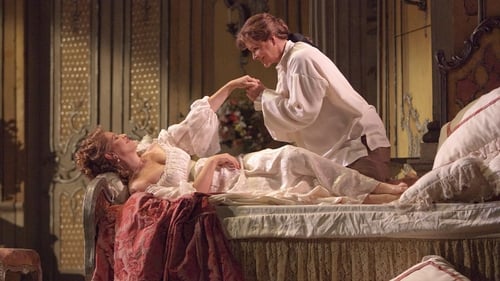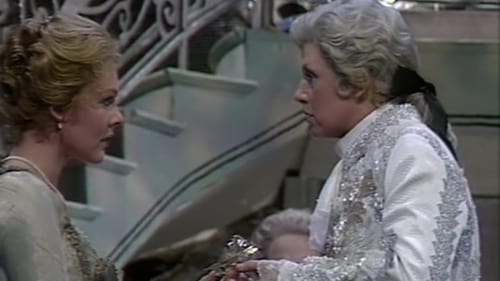
Writer

Writer
In his new production, Robert Carsen places the action at the end of the Habsburg Empire, underscoring the opera’s subtext of class and conflict against a rich backdrop of gilt and red damask

Writer
2014 marks a year of celebration recognizing the 150th birthday year of the German late-Romantic orchestral, operatic and lied master composer, Richard Strauss (1864-1949). Arabella (premiered 1933, Dresden) was the last of the half dozen Strauss works to feature a libretto by the great Austrian writer Hugo von Hofmannsthal. This production, from the most recent Salzburg Easter Festival is, after Capriccio, the second of three Richard Strauss operas C Major is releasing in honor of the composers birth, life and work. The star-laden cast includes soprano Renèe Fleming, baritone Thomas Hampson, Albert Dohmen (Covent Garden, Wiener Staatsoper, MET) and Gabriela Beaková (Wiener Staatsoper, Covent Garden). With Christian Thielemann and the Staatskapelle Dresden, the music of Richard Strauss is in the best of hands. (ORF) Thielemann gets the best out of the cast...especially Renée Fleming with her luxurious soprano FAZ

Writer
Starring Jonas Kaufmann as Bacchus and featuring Emily Magee with Daniel Harding conducting the Vienna Philharmonic, Ariadne auf Naxos was filmed at the acclaimed Salzburg Festival in 2012. This release also includes "Le Bourgeois gentilhomme."

Writer
Flemings voice might have been made for Ariadne and she achieved a great personal triumph in this production: The chief glory of the evening was hearing Renee Fleming, the Straussian soprano par excellence, making her role debut as Ariadne… As the possessor of what is, possibly, the most beautiful soprano voice in the world, she put her vocal treasures in the service of an empathic, nuanced interpretation of the role. From the creamy top, through a rich, warm middle, to the bewitching, darker colours of her lower register, Fleming poured her magnificent sound into Strausss enchanting melodic arcs, animating the sadness, vulnerability, and desire of the bereft princess...

Writer
Christian Thielemann conducts this Staatskapelle Dresden production of Richard Strauss' chamber opera. The opera follows events at the home of the wealthiest man in Vienna, who has booked both a comedy burlesque act and a serious opera group for entertainment. When the dinner runs long he declares that both forms of entertainment must take place at the same time - much to the chagrin of the opera's proud young composer. Filmed live in Baden-Baden on Feb. 25 by the veteran director Brian Large, Renée Fleming makes her debut in the role of Ariadne together with fellow key Strauss interpreters Sophie Koch and Christian Thielemann, following on from their Rosenkavalier triumph. Thielemann conducts the Staatskapelle Dresden, the orchestra to whom Strauss dedicated his Alpine Symphony and which premiered Feuersnot, Salome, Elektra, Der Rosenkavalier and Daphne.

Writer
Based on archive holdings from nine decades, director Hannes Rossacher has created a complete Jedermann performance and thus a unique cultural-historical puzzle from Alexander Moissi to Nicholas Ofczarek. The success story of the phenomenon "Everyman" is told in an unprecedented way.

Writer
This performance of the Richard Strauss opera Frau ohne Schatten, recorded live and in high definition, features vocalists like Stephen Gould, Anne Schwanewilms, Michaela Schuster, and Wolfgang Koch in the leading roles.

Writer
ユングが提唱した「エレクトラ・コンプレックス」(女児が父親に対し強い愛情を抱き、母親を敵対視すること)の由来となったギリシャ神話に登場する王女の葛藤の物語にシュトラウスは極めて暴力的で陶酔的な音楽を付けています。エレクトラは100分を越える全曲にほとんど出ずっぱり。息詰まるような歌を歌いながら体中から憎しみを発散させなくてはいけません。ここではテオリンが独特のメイクと眼力、そして蛇のような動きでこの難役を文句なく演じています。彼女に対峙する母親クリテムネストラは、それ以上に海千山千の女。名歌手マイヤーが持てる底力をとくと見せ付けてくれます。純情な妹クリソテミスもなかなかの食わせ者。ウェストブロークが良い味だしています。パーペを始めとした男声陣もなかなかです。レーンホフの演出は、あからさまで、動き一つ一つが台詞に沿っており、また、幕切れの場面は決して結末をぼかすことなく全てを白日の下に晒し出します。

Writer
The richness and intensity of Richard Strauss's masterful one-act opera, in Herbert Wernicke's compelling production, vividly portrays the relentless pursuit and ecstatic realization of vengeance. Featuring Linda Watson, Jane Henschel, Manuela Uhl, Rene Kollo, and Albert Dohmen. The Philharmonia Chor Wien and Münchner Philharmoniker are conducted by Christian Thielemann

Writer
This production of Strauss’s most sumptuous work by director Nathaniel Merrill and designer Robert O’Hearn is almost as beloved as the opera itself. It perfectly captures the glittering never-land of rococco Vienna the way the Viennese—and the rest of the world—wish it had been, and it’s the ideal setting for an adult comedy of love and errors. Susan Graham is the aristocratic young Octavian, torn between two women: Renée Fleming as the Marschallin, the mature woman who understands that one day Octavian must leave her; and Christine Schäfer as Sophie, the young girl who unexpectedly captures his heart. Kristinn Sigmundsson is the lecherous Baron Ochs who sets the whirling plot in motion, and Edo de Waart conducts.

Writer
The Semperoper caused a sensation in November 2007 when it visited Japan for the first time in twenty-six years. The demand for tickets and the audience's enthusiasm were unprecedented, not least because the company was staging a piece that is performed more authentically in Dresden than anywhere else in the world: Richard Strauss' Der Rosenkavalier, which received its first performance in Dresden in 1911. Leading the ensemble was the radiant-voiced and profoundly thoughtful Marschallin of Anne Schwanewilms.

Writer
This 2004 production of Richard Strauss's three-act comic opera Der Rosenkavalier (1911) emerged from the efforts of the Grosses Festspielhaus Salzburg. It stars Adrianne Pieczonka as Feldmarschallin, Franz Hawlata as Baron Ochs, Angelika Kirchschlager as Octavian and Franz Grundheber as Faninal. The Konzertvereinigung Wiener Staatsopernchor and the Wiener Philharmoniker lend added musical support, with Rupert Huber serving as chorus master of the former and Semyon Bychkov conducting the latter.

Theatre Play
Austrian television director Fritz Lehner makes his feature debut with the big-budget drama Jedermann's Fest, based on the 1911 play by Hugo von Hofmannsthal, which in turn was based on a medieval tale. Originated in parts of England, the myth of Jan Jedermann ("John Everyman") deals with a rich man on his deathbed coming to terms with his life's failures. Not following much of a plot, the modernized version involves famous fashion designer Jedermann (Klaus Maria Brandauer) imagining his last big gala event while rendered unconscious as a result of a car accident in his Ferrari. He is a success in Vienna but not in fashionable Paris, so he wishes to impress French elder stateswoman Yvonne Becker (Juliette Greco).

Writer
Among the greatest operas in Richard Strauss's oeuvre, "Der Rosenkavalier (The Cavalier of the Rose)" spins the tale of the Marschallin (Elizabeth Whitehouse), a dowager struggling with old age. Making the transition more difficult is Octavian (Ildiko Komlosi), a lover many years her junior. This 1997 Palermo production, under the baton of maestro Pier Luigi Pizzi, co-stars Daniel Lewis Williams as Baron Ochs, the Marschallin's obnoxious cousin.

Writer
A production of Die Frau ohne Schatten filmed in Japan.

Writer
Felicity Lott, Anne-Sofie Von Otter, and Kurt Moll star in this production of Richard Strauss' opera, staged in Vienna in 1994. A romantic comedy of errors. Princess von Werdenberg must hide her affair with Octavian from her family; when he disguises himself as a chambermaid to avoid scandalizing the Princess, he is pressed into presenting a gift to Baron Ochs von Lerchenau, who has arrived to propose marriage to Sophie von Faninal. However, Ochs soon finds himself infatuated with the chambermaid, much to Octavian's chagrin, which proves to be only the first of a long series of romantic misunderstandings. This production of Der Rosenkavalier is performed by the Vienna State Orchestra and Chorus, under the direction of Carlos Kleiber.

Story
The Otto Schenk production of Richard Strauss's "Elektra", filmed live at the Metropolitan Opera in January, 1994. Hildegard Behrens stars as Elektra, with Deborah Voigt as Chrysothemis, Brigitte Fassbaender as Klytämnestra, Donald McIntyre as Orest, and James King as Aegisth. James Levine conducts.

Writer

Writer
Recorded at the Vienna State Opera house in 1989, this staging of Richard Strauss and Hugo von Hofmannsthal’s Elektra is one of the glories of live opera on film, deserving of eternal availability. The DVD picture has great clarity, despite the darkness of Hans Schavernoch’s set design. Other than the cliché of a huge statue head, toppled on its side, the set manages to be suitably representative of a decaying palace as well as an imposing, theatrical space, dominated by the mammoth body of the statue from which the head apparently dropped, draped with the ropes that seem to have enabled the decapitation. Sooner or later most of the characters cling to and twist around those ropes, an apt stage metaphor for the remorseless repercussions from the murder of Agammenon by his unfaithful wife Klytämnestra and her paramour, Aegisthus. Reinhard Heinrich’s costumes capture a distant era while sustaining a creepily modern look — part Goth, part homeless, part Spa-wear.

Writer
Jessye Norman is a regal Ariadne, the mythological Greek heroine in this opera-within-an-opera, opposite the passionate Bacchus of the great James King. Kathleen Battle delivers the coloratura fireworks of Zerbinetta, the leader of a commedia dell’arte troupe that finds itself stranded on Ariadne’s island. Tatiana Troyanos and Franz Ferdinand Nentwig star as the young Composer and the Music Master in the opera’s prologue. James Levine brings out all the color and charm of Strauss’s brilliant chamber-sized score with its equal amounts of pathos and humor. Bodo Igesz’s production features sets by esteemed designer Oliver Messel.

Writer
Live performance, new production season 1984-5. BBC 2 Television relay on 30 March 1985 of performance of February 11.

Writer
A production of Strauss' opera 'Der Rosenkavalier' performed at the Saltzburg Festival in 1984. Includes the Vienna State Opera Choir, the Philharmonic Orchestra with singers Wilma Lipp, Anna Tomowa-Sintow and Agnes Baltsa. Conducted by Herbert Von Karaja

Writer
The Metropolitan Opera live production of Richard Strauss's opera Elektra on February 16, 1980

Writer
1979年に行われたカルロス・クライバー指揮によるR・シュトラウスの楽劇「ばらの騎士」の模様を映像化。グィネス・ジョーンズの元帥夫人ら錚々たる顔ぶれが共演。

Writer

Writer
Opera by Strauss

Story
The story: While her husband is becoming famous in the war, the marshal of Werdenberg's wife consoles herself in the arms of the youngster Octavian and tries to arrange the love affairs of her cousin, the baron Ochs, by presenting him to young Sophie. This baron is taken with her and the Marschallin proposes Octavian to be his "Rosenkavalier" in order to present the traditional silver rose to his fiancée. But youngsters are youngsters and sex hormones hold sway over the whole world so for that reason immediately Octavian and Sophie fall in love with each other…

Writer
Based on several medieval mystery plays, including the late 15th-century English morality play "Everyman". The premise is that the good and evil deeds of one's life will be tallied by God after death, as in a ledger book. The drama is the allegorical accounting of the life of Everyman, who represents all mankind.

Story
In 1911 the German poet Hugo von Hofmansthal wrote a new version of the medieval morality play Everyman, and this was staged in Danish translation at the Royal Theatre in Copenhagen in 1915. At the time, it was radical example of symbolist abstraction. Its success inspired a film version, Enhver [Everyman], directed by Vilhelm Glückstadt for Filmfabrikken Danmark. The film, however, was set in a modern-day environment. It depict the moral choice confronting its protagonist at struggle because two attendant spirits, one good and one bad. The protagonist is tempted by dark figure of evil and succumbs, rejecting God and leading a life of iniquity, but he is then haunted by guilty visions until he finally dies, asking God for forgiveness at the last moment.

Theatre Play
In 1911 the German poet Hugo von Hofmansthal wrote a new version of the medieval morality play Everyman, and this was staged in Danish translation at the Royal Theatre in Copenhagen in 1915. At the time, it was radical example of symbolist abstraction. Its success inspired a film version, Enhver [Everyman], directed by Vilhelm Glückstadt for Filmfabrikken Danmark. The film, however, was set in a modern-day environment. It depict the moral choice confronting its protagonist at struggle because two attendant spirits, one good and one bad. The protagonist is tempted by dark figure of evil and succumbs, rejecting God and leading a life of iniquity, but he is then haunted by guilty visions until he finally dies, asking God for forgiveness at the last moment.

Writer
Mauritz Stiller directed adaptation of Hugo von Hofmannsthal's Das fremde Mädchen.

Writer
Opera in one act with prologue. Based on the production of the Vienna State Opera by Filippo Sanjust. Libretto by Hugo von Hofmannsthal
























